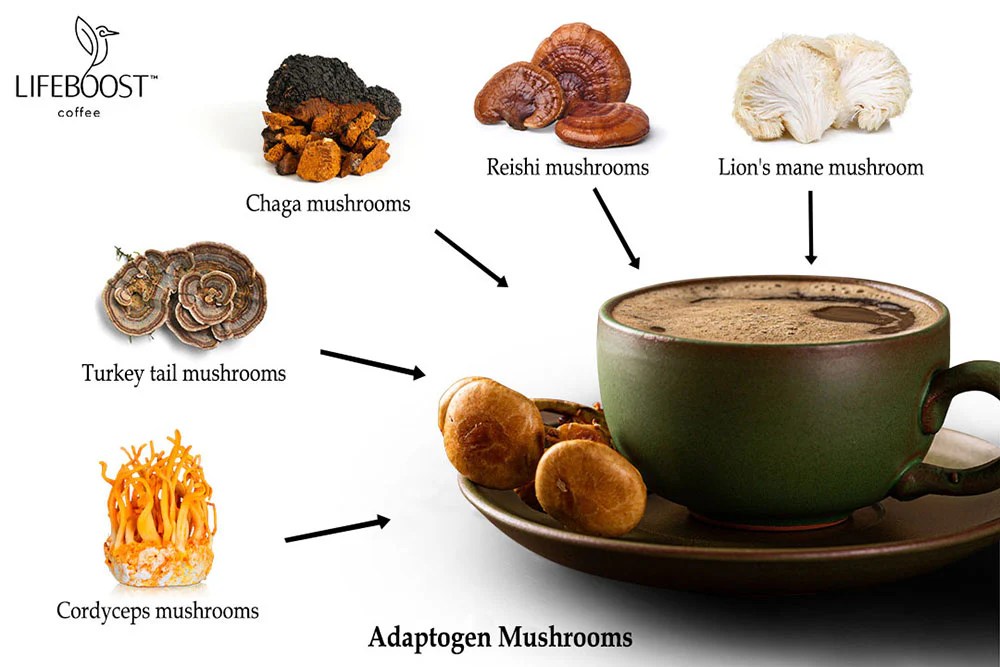Introduction to Mushroom Coffee: Mushroom Coffee Nutrition Facts

Mushroom coffee nutrition facts – Mushroom coffee is a beverage that combines the stimulating effects of coffee with the purported health benefits of various medicinal mushrooms. It’s gaining popularity as a functional beverage, offering a potential alternative to traditional coffee for those seeking enhanced energy and wellness. The addition of mushrooms doesn’t drastically alter the taste of coffee; rather, it often adds subtle earthy notes, depending on the type of mushroom used.Mushroom coffee blends typically incorporate finely ground mushrooms into the coffee grounds before brewing.
Unlocking the amazing health benefits of mushroom coffee? Let’s dive into the nutritional powerhouse that is mushroom coffee! For a delicious contrast, check out the nutritional breakdown of jonny pops strawberry chocolate nutrition facts , a sweet treat. Then, get back to fueling your day the healthy way with all the amazing nutrients packed into your favorite mushroom coffee!
The mushrooms are not simply added as a garnish or topping; they are integrated into the brewing process, allowing their compounds to infuse into the final beverage. This integration allows for a more holistic experience, combining the stimulating properties of coffee with the potential functional benefits of the mushrooms.
Types of Mushrooms Used in Mushroom Coffee
A variety of mushrooms are used in mushroom coffee blends, each offering a unique profile of potential health benefits. The choice of mushroom often influences the final taste and purported effects of the beverage. Some of the most commonly used mushrooms include:
- Lion’s Mane: Known for its potential cognitive-enhancing properties, lion’s mane is often touted for improving focus and memory.
- Chaga: This mushroom is rich in antioxidants and is often associated with immune support.
- Cordyceps: Often linked to athletic performance and energy levels, cordyceps are believed to improve stamina and endurance.
- Reishi: Known for its adaptogenic properties, reishi is often associated with stress reduction and immune system modulation.
- Turkey Tail: This mushroom is frequently included for its potential immune-supporting benefits.
It’s important to note that while these mushrooms have shown promise in research, more studies are needed to confirm their effects on human health. The effects can vary greatly depending on the specific mushroom species, growing conditions, processing methods, and the individual consuming the beverage.
Making Mushroom Coffee
The process of making mushroom coffee is similar to making regular coffee, with the key difference being the addition of the ground mushrooms. The mushrooms are typically finely ground, often to a powder consistency, ensuring proper infusion during brewing. Several methods can be used:
- Direct Addition to Grounds: Mix the ground mushrooms directly with your regular coffee grounds before brewing using your preferred method (e.g., French press, drip coffee maker, pour-over).
- Pre-infusion: Steep the mushroom powder in hot water for a few minutes before adding coffee grounds and brewing.
- Blending: Blend the mushroom powder with your brewed coffee for a smoother consistency.
The specific brewing method and ratio of coffee to mushrooms can be adjusted to personal preference. Experimentation is key to finding the ideal balance of taste and desired effects. Many commercially available mushroom coffee blends provide specific instructions for brewing.
Nutritional Composition of Mushroom Coffee
Mushroom coffee, a burgeoning trend in the beverage industry, blends the familiar kick of coffee with the purported health benefits of functional mushrooms. Understanding its nutritional profile is crucial for assessing its potential impact on health and well-being. This section delves into the nutritional composition of mushroom coffee, comparing it to regular coffee and exploring the potential health benefits of its unique constituents.
Nutritional Content Comparison: Mushroom Coffee vs. Regular Coffee
The nutritional content of mushroom coffee varies depending on the type and amount of mushrooms used, as well as the coffee beans themselves. However, we can offer a general comparison using typical values found in commercially available brands.
| Nutrient | Mushroom Coffee (per serving, approximate) | Regular Coffee (per serving, approximate) | Notes |
|---|---|---|---|
| Caffeine (mg) | 80-150 | 80-150 | Caffeine content is similar, as the addition of mushrooms doesn’t significantly alter it. |
| Carbohydrates (g) | 2-5 | 0-1 | Mushrooms contribute to the higher carbohydrate content. |
| Protein (g) | 1-3 | 0-1 | Mushrooms are a source of protein, unlike regular coffee. |
| Fat (g) | <1 | <1 | Both are generally low in fat. |
| Fiber (g) | 1-3 | 0 | Mushrooms significantly increase fiber content. |
| Vitamins/Minerals | Vary depending on mushroom type; may include B vitamins, potassium, selenium, etc. | Minimal vitamins and minerals. | Mushroom varieties contribute a range of micronutrients. For example, Chaga mushrooms are known for their high antioxidant content. |
Potential Health Benefits of Mushroom Coffee Nutrients
The enhanced nutritional profile of mushroom coffee, compared to regular coffee, suggests several potential health benefits. The added fiber contributes to improved digestive health and can promote feelings of fullness, potentially aiding in weight management. The presence of various vitamins and minerals, depending on the mushroom blend, offers a broader spectrum of micronutrients than regular coffee alone. For instance, the B vitamins can support energy production and nervous system function, while selenium acts as a powerful antioxidant.
The potential immunomodulatory effects of certain functional mushrooms, such as lion’s mane and chaga, are also a subject of ongoing research. However, it is crucial to remember that these benefits are dependent on the specific mushroom species included in the blend and the quality of the ingredients. More research is needed to definitively establish the extent of these benefits in humans.
Mushroom Coffee and Dietary Considerations

Mushroom coffee’s versatility makes it a suitable addition to various dietary approaches, offering potential benefits alongside existing nutritional strategies. Its low calorie count and potential for enhanced satiety can be particularly advantageous in certain diets, while its adaptability allows for seamless integration into others.Mushroom coffee’s impact on different diets hinges on its nutritional profile and the individual’s overall dietary plan.
Understanding how its components interact with specific macronutrient ratios and dietary restrictions is crucial for maximizing its benefits.
Mushroom Coffee and Ketogenic Diets
The ketogenic diet, characterized by high fat, moderate protein, and very low carbohydrate intake, often benefits from beverages that are low in carbohydrates and support satiety. Mushroom coffee, being naturally low in carbohydrates, aligns well with ketogenic principles. The addition of healthy fats, such as those found in MCT oil or coconut oil, commonly added to mushroom coffee, further enhances its keto-friendliness.
The caffeine content can also provide a boost in energy levels, often a concern during the keto adaptation phase. However, individuals should monitor their overall carbohydrate intake from all sources, including the mushroom coffee itself and any added ingredients, to maintain ketosis.
Mushroom Coffee and Vegan Diets
Mushroom coffee naturally fits into a vegan lifestyle as it contains no animal products. The mushrooms themselves are plant-based, and the coffee beans are typically ethically sourced. Many mushroom coffee blends utilize additional vegan-friendly ingredients, such as spices, extracts, or plant-based sweeteners. The beverage provides a source of antioxidants and functional mushrooms that can supplement a vegan diet, although it is important to ensure the chosen blend is free from any animal-derived components or processing aids.
Incorporating Mushroom Coffee into a Balanced Diet
A balanced diet requires careful consideration of macronutrients, micronutrients, and overall caloric intake. Mushroom coffee, while nutritious, should be incorporated thoughtfully.
- Start with a small amount (e.g., 1 cup) daily and gradually increase as tolerated. Observe any potential digestive effects.
- Choose blends that align with your dietary goals and preferences. Look for blends with added ingredients that complement your overall nutritional needs.
- Consider the time of day you consume mushroom coffee. Its caffeine content might be more suitable in the morning or early afternoon to avoid sleep disturbances.
- Pair mushroom coffee with a balanced meal or snack to avoid potential blood sugar fluctuations.
- Monitor your energy levels and adjust your intake based on your individual response. The caffeine content can affect people differently.
Enhancing Flavor with Mushroom Coffee
Mushroom coffee’s earthy notes can enhance the flavor profile of various foods and beverages.
- Lattes and Smoothies: Adding mushroom coffee powder to your favorite latte recipe or smoothie can create a unique and creamy texture, adding a subtle earthy flavor.
- Baking: Incorporating mushroom coffee powder into baked goods like muffins or cakes can add depth and complexity to the flavor profile. The amount should be adjusted depending on the recipe and desired intensity.
- Savory Dishes: In some cuisines, coffee grounds are used in savory dishes. Experiment cautiously with a small amount of mushroom coffee powder in stews or sauces to add a unique earthy dimension.
- Mushroom Coffee Ice Cream: A more adventurous approach would involve incorporating mushroom coffee powder into ice cream recipes, creating a unique dessert with a hint of earthiness and caffeine.
Choosing and Preparing Mushroom Coffee

Selecting and preparing mushroom coffee correctly significantly impacts its flavor and the bioavailability of its beneficial compounds. Choosing high-quality ingredients and employing the right brewing method are crucial steps in maximizing the enjoyment and health benefits of this unique beverage.Selecting high-quality mushroom coffee requires careful consideration of several factors. Look for brands that clearly list the species of mushrooms used, ideally specifying the
- exact* mushroom species (e.g.,
- Ganoderma lucidum*, not just “reishi”). Transparency in sourcing and processing is key; reputable companies often provide details about their mushroom cultivation practices and any certifications (organic, etc.). The grind should be consistent and appropriate for your chosen brewing method – finer grinds for methods like espresso, coarser for French press. Finally, examine the aroma; a pleasant, earthy scent is indicative of freshness and quality.
Avoid products with artificial flavors or additives.
Mushroom Coffee Brewing Methods
Several methods can be used to prepare mushroom coffee, each yielding a slightly different texture and flavor profile. The choice depends on personal preference and available equipment.
The French press method is popular for its simplicity and ability to extract a rich, full-bodied brew. Simply add the desired amount of mushroom coffee grounds to a French press, pour hot (but not boiling) water over them, stir gently, and steep for 4-5 minutes before slowly pressing the plunger. This method allows for more control over extraction and minimizes the risk of over-extraction, which can lead to a bitter taste.
Blending mushroom coffee with hot water or milk creates a smoother, more consistent texture, especially beneficial if you prefer a creamier drink. Add the grounds to a blender with your preferred liquid and blend until smooth. This method is excellent for incorporating other ingredients like spices or sweeteners.
Other methods, such as using a drip coffee maker or Aeropress, are also viable, though adjustments to the grind size and brewing time may be necessary to achieve optimal results. Experimentation is key to discovering your preferred method.
Mushroom Coffee Storage, Mushroom coffee nutrition facts
Proper storage is essential to maintain the freshness and quality of your mushroom coffee. Store unopened bags in a cool, dark, and dry place, away from direct sunlight and strong odors. Once opened, transfer the remaining grounds to an airtight container to prevent exposure to moisture and oxygen, which can lead to spoilage and loss of flavor. Refrigeration can further extend the shelf life, although freezing is generally not recommended as it can affect the texture and flavor.
Pay close attention to the “best by” date on the packaging and consume the coffee before it expires to ensure optimal quality.
Detailed FAQs
Can mushroom coffee cause digestive issues?
Some individuals may experience mild digestive upset, such as bloating or gas, particularly when initially introducing mushroom coffee into their diet. Starting with small amounts and gradually increasing intake can help mitigate these effects.
Is mushroom coffee suitable for pregnant or breastfeeding women?
Due to limited research on the effects of mushroom coffee during pregnancy and breastfeeding, it’s advisable to consult with a healthcare professional before consuming it.
Are there any drug interactions associated with mushroom coffee?
While generally considered safe, mushroom coffee may interact with certain medications. Individuals taking prescription drugs should consult their doctor or pharmacist before incorporating mushroom coffee into their routine.
How does the taste of mushroom coffee compare to regular coffee?
The taste varies depending on the type of mushroom and brewing method. Many find it to have an earthy undertone that complements the coffee flavor, while others describe a slightly milder, less bitter taste than regular coffee.

